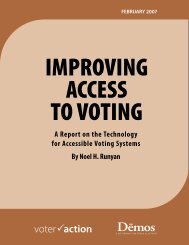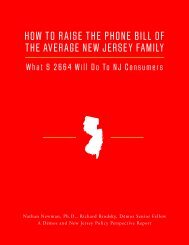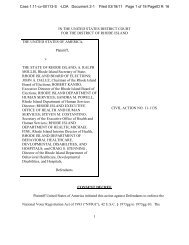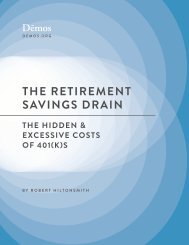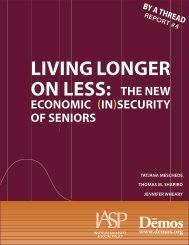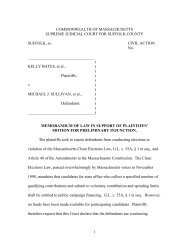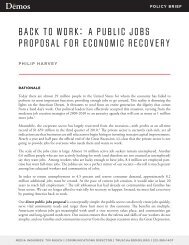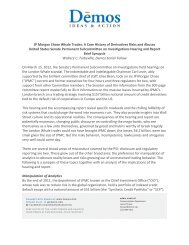Bullies at the Ballot Box - Demos
Bullies at the Ballot Box - Demos
Bullies at the Ballot Box - Demos
Create successful ePaper yourself
Turn your PDF publications into a flip-book with our unique Google optimized e-Paper software.
aSSeSSment:<br />
are VoterS ProteCted?<br />
hoW IS <strong>the</strong> Challenge reSolVed?<br />
Wh<strong>at</strong> muSt a Challenger do<br />
to FIle a Challenge?<br />
Who Can Challenge<br />
BeFore eleCtIon day?<br />
St<strong>at</strong>e<br />
S<strong>at</strong>ISFaCtory<br />
Ohio is exemplary in requiring hearings<br />
before cancelling a registr<strong>at</strong>ion,<br />
and specifying th<strong>at</strong> returned mail and<br />
evidence from foreclosure proceedings<br />
is insufficient by <strong>the</strong>mselves to<br />
warrant a challenge.<br />
Although Ohio has made gre<strong>at</strong><br />
strides in its election administr<strong>at</strong>ion,<br />
particularly concerning pre-Election<br />
Day challenges, it should clarify<br />
th<strong>at</strong> <strong>the</strong> burden of proof remains<br />
on <strong>the</strong> challenger. Its 2008 directive<br />
(2008-79) required <strong>the</strong> challenger to<br />
bear <strong>the</strong> burden of proof to justify a<br />
challenge “by clear and convincing<br />
evidence.” Ohio should restore this<br />
requirement.<br />
Election boards have discretion over whe<strong>the</strong>r<br />
to hear a challenge, but hearings are required<br />
before cancelling a voter’s registr<strong>at</strong>ion.<br />
Mail returned as “undeliverable”, or evidence<br />
of a foreclosure action, are both insufficient<br />
grounds by <strong>the</strong>mselves to grant a challenge<br />
and cancel a voter’s registr<strong>at</strong>ion.<br />
Directive 2012-30: Pre Election Voter<br />
Challenges<br />
A challenge may be made in person<br />
or in writing, must st<strong>at</strong>e <strong>the</strong> grounds<br />
upon which <strong>the</strong> challenge is made,<br />
and must be signed by <strong>the</strong> challenger<br />
giving <strong>the</strong>ir own address and voting<br />
precinct.<br />
OH. REV. CODE ANN. § 3505.19<br />
Challenges must be “signed under<br />
penalty of election falsific<strong>at</strong>ion.”<br />
OHIO REV. CODE ANN.<br />
§ 3503.24.<br />
ohIo Any registered voter may<br />
challenge any o<strong>the</strong>r person’s<br />
right to vote.<br />
OH. REV. CODE ANN.<br />
§ 3505.19<br />
unS<strong>at</strong>ISFaCtory<br />
Pennsylvania’s laws do not adequ<strong>at</strong>ely<br />
protect an eligible registered voter<br />
from being wrongfully kicked off <strong>the</strong><br />
voting rolls. could improve its laws<br />
by requiring hearings for challenges<br />
by affidavit. It should require <strong>the</strong><br />
challenger, not <strong>the</strong> voter, to bear <strong>the</strong><br />
burden of proof.<br />
1 - Challenge by petition: Upon receipt of <strong>the</strong><br />
petition, <strong>the</strong> commission is required to cancel<br />
or suspend <strong>the</strong> registr<strong>at</strong>ion “unless <strong>the</strong> registered<br />
elector so registered appears and shows<br />
cause why this action should not be taken.”<br />
25 PA. STAT. ANN. § 1509.<br />
2 - Challenge by affidavit: The challenged<br />
voter must respond in a written, sworn st<strong>at</strong>ement,<br />
and must produce “such o<strong>the</strong>r evidence<br />
as may be required to s<strong>at</strong>isfy <strong>the</strong> registrar or<br />
commissioner as to <strong>the</strong> individual’s qualific<strong>at</strong>ions<br />
as a qualified elector.”<br />
25 PA. STAT. ANN. § 1329<br />
There are two procedures:<br />
1 - Challenge by petition: The<br />
challenger submits under o<strong>at</strong>h or<br />
affirm<strong>at</strong>ion, a petition th<strong>at</strong> sets forth<br />
“sufficient grounds” for <strong>the</strong> cancell<strong>at</strong>ion<br />
of a voter’s registr<strong>at</strong>ion. Must<br />
be filed no l<strong>at</strong>er than 10 days prior to<br />
<strong>the</strong> election. This must include ei<strong>the</strong>r<br />
a) a notice of when and where <strong>the</strong><br />
petition will be personally given to<br />
<strong>the</strong> challenged voter by <strong>the</strong> challenger,<br />
within 24 hours prior to filing; or<br />
b) a st<strong>at</strong>ement th<strong>at</strong> <strong>the</strong> challenged<br />
voter “could not be found” <strong>at</strong> <strong>the</strong><br />
challenged voter’s recorded residence,<br />
and th<strong>at</strong> <strong>the</strong>y no longer live <strong>at</strong> th<strong>at</strong><br />
address.<br />
25 PA. STAT. ANN. § 1509<br />
2 - Challenge by affidavit: The challenger<br />
is required to file an affidavit<br />
explaining <strong>the</strong> “reason” for <strong>the</strong> challenge,<br />
but is under no oblig<strong>at</strong>ion to<br />
provide any documentary evidence.<br />
The law does not set a pre-election<br />
filing deadline.<br />
25 PA. STAT. ANN. § 1329.<br />
PennSylVanIa Any qualified voter may<br />
challenge a voter by petition.<br />
25 PA. STAT. ANN. § 1509<br />
Only a commissioner,<br />
registrar, clerk or a qualified<br />
elector in <strong>the</strong> same municipality<br />
as <strong>the</strong> voter, may<br />
challenge by affidavit.<br />
25 PA. STAT. ANN. § 1329<br />
36 • aPPendIx 1 | St<strong>at</strong>e Laws Governing Pre-Election Day Challenges




